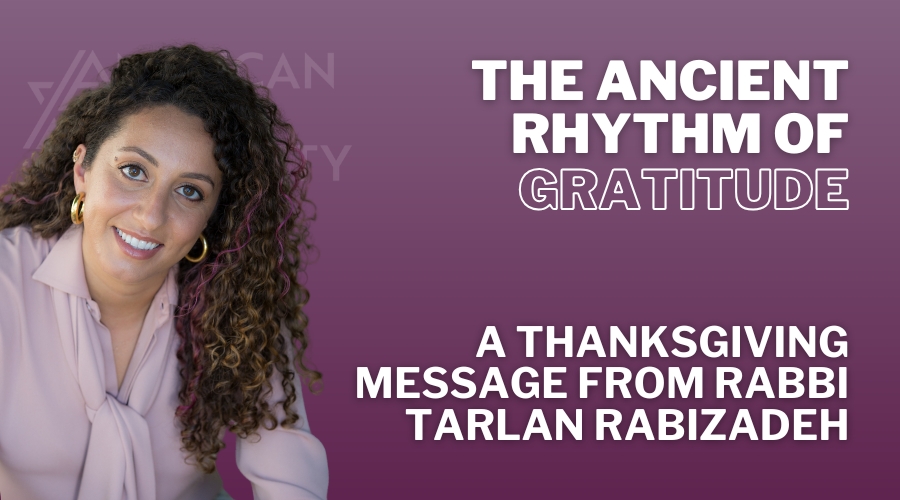
May this season open our eyes, widen our hearts, and deepen our awareness of the blessings that surround us.
In Judaism, we are asked to pray every day — three times a day, in fact — and our ancient tradition gives us an order: praise, then petition, then thanks.
The sequence matters.
PRAISE
When we wake up, we’re invited to notice the simple miracles of being alive: the rooster that crows (our ancestors were farmers, after all), the rising sun, the gift of sight, the return of our souls after sleep. These words of praise aren’t meant to flatter God — they’re meant to teach us. They remind us, gently and consistently, that we did not create this world ourselves. Most of what we rely on, marvel at and enjoy are gifts.
Praise softens us. It reorients us. It names the wonders we forget.
PETITION
Only after we acknowledge what we’ve been given — our legs that carry us, our breath, our homes, our ability to live another day — are we ready to ask for what we need.
Too often, our instinct is to begin here:
God, I need a new car. I need a job. I need a sign, an answer, a miracle.
But when we start by grounding ourselves in what we already have, our asking changes. Our requests become clearer, truer, deeper:
Do I really need the car, or do I need help becoming more open-minded and compassionate?
Do I need the new job, or do I need courage, clarity or healing?
Do I need something material — or something spiritual?
When we look at our siddur, our prayerbook, we see the longings of generations before us: prayers for rain, for sustenance, for justice, for our “daily bread,” for peace. They asked not for luxury, but for life.
THANKSGIVING
Finally, we close in a posture of gratitude. Praise may open our eyes, but prayers of thanksgiving anchor our awareness. It’s the moment when we don’t just recognize the blessings around us — we truly register that they’ve been placed in our hands.
We often like to believe we earned every wondrous thing we have. But prosperity is not always the result of effort or ambition. Much of life has nothing to do with our striving and everything to do with the circumstances we were born into. You cannot work your way into a natural talent, your health, or a safe, loving family. These are gifts — given, not achieved.
The Talmud teaches:
“One who enjoys the fruits of this world without blessing them is like a thief” (Berakhot 35a).
When we use something of this world, we bless the Source who made it possible. This isn’t about obligation; it’s about awareness. Even in the difficult chapters of life, gratitude can steady us. It reminds us that our story isn’t defined only by what hurts, but also by what sustains us.
A THANKSGIVING TEACHING
As Americans, the holiday of Thanksgiving invites us to pause and consider what we’re grateful for. Our history — complex as it is — brought us to this moment. We live with freedoms others can only imagine. And yes, we all want better for our lives, our communities, our country.
But a core Jewish teaching reminds us:
If you live only in the space of what you lack, you will never recognize how much you have.
Some of us have more, some less. But every one of us carries gifts — seen and unseen.
So as you gather at your tables this season, I invite you to follow our ancient pattern:
Notice what you praise.
Make sure you ask for what you truly need.
And above all, name the gifts you were given. Because there is so much to be thankful for.
May this season open our eyes, widen our hearts, and deepen our awareness of the blessings that surround us.
Happy Thanksgiving.
Rabbi Tarlan Rabizadeh is Vice President for Jewish Engagement at American Jewish University, where she directs the Maas Center for Jewish Journeys and Miller Introduction to Judaism
Contact Communications
Michelle Starkman, M.A., MBA
Vice President, Communications
michelle.starkman aju.edu
aju.edu
(310) 440-1526
